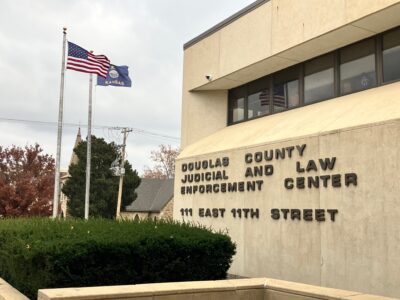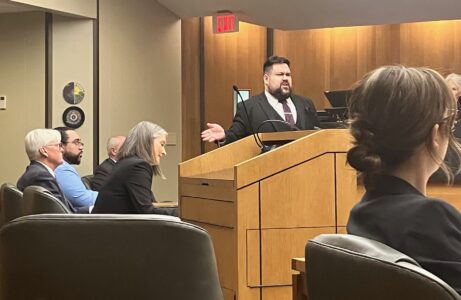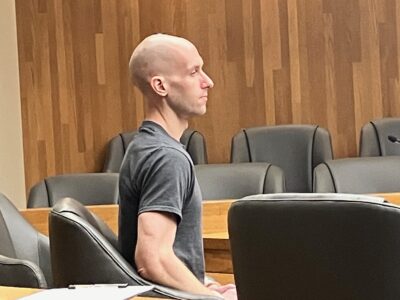As of Oct. 15, all police scanner traffic in Douglas County will be encrypted and unavailable to public and news outlets

photo by: Douglas County
The Emergency Communications Center is pictured on Nov. 3, 2023, on the second floor of the Judicial and Law Enforcement Center.
The days of police business being aired over a “scanner” are nearing their end as Douglas County law enforcement agencies move to a system of fully encrypted radio communication to comply with a federal mandate.
This means that the public, including news outlets, will not be able to hear over a police scanner communications between law enforcement and emergency dispatch regarding incidents such as car chases, shootings and other matters. Fire and medical radio traffic will not be encrypted, however.
Douglas County Sheriff Jay Armbrister acknowledged that the encryption necessarily reduced public transparency about certain aspects of law enforcement, and he noted that it was a federal mandate, not a local choice, but he expected that it would ultimately make law enforcement safer and more effective.
The change, to go into effect Oct. 15, will apply to the four agencies whose calls go through the county’s dispatch system: the Douglas County Sheriff’s Office and the police departments in Lawrence, Eudora and Baldwin City.
The move to encryption is to comply with the FBI’s Criminal Justice Information Services Security Policy, Armbrister said. That policy went into effect nearly two years ago, in December 2022, and required local and state agencies to gain the capabilities — namely, buying encryption-capable radios — to protect personal information that’s transmitted over the air.
Each officer or deputy has a portable radio and a patrol car radio, and all of those have had to be upgraded or replaced to allow encryption. The jail also has multiple radios. Armbrister did not immediately provide the total number of radios, but he said the portable radios can cost $6,000 to $7,000 each.
“They are very expensive,” he said, partially explaining why it has taken nearly two years to acquire them all. Additionally, he said that law enforcement agencies across the country had been scrambling to acquire the radios, creating a backlog of orders.
Armbrister described the encryption system as an unfunded federal mandate. “They gave us exactly zero dollars to fulfill the mandate,” he said, but he nevertheless embraced facets of the change — principally, that it would allow law enforcement personnel to communicate more freely and thoroughly without having to worry that they are divulging personal details, as well as crime locations that he said, for safety reasons, shouldn’t be publicized in real time.
The information that the FBI has said needed protection includes names, birth dates, addresses, medical details and other identifying facts that law enforcement personnel share with each other about suspects, witnesses and victims while they are working a scene or executing a warrant.
Fire and medical radio traffic will not be encrypted because with those calls personal information is generally not communicated via the radio to comply with Health Insurance Portability and Accountability Act, or HIPAA, regulations.
The FBI’s Criminal Justice Information Services system is basically a database that’s available to the law enforcement community nationwide. Agencies can submit information to, and obtain information from, CJIS regarding criminal identities and histories, missing persons and a host of other data — an exchange that’s heavily relied upon by law enforcement.
Local agencies will be audited by the Kansas Highway Patrol to ensure compliance with the federal security policy, and agencies risk being fined or losing access to CJIS if they are not in compliance.
The Oct. 15 date was set locally, not by the FBI, which Armbrister said is, for now, giving agencies time to acquire encrypted radio devices before at some point setting a firm compliance deadline.
Other counties in Kansas have worked to recently encrypt law enforcement radio traffic, including most police agencies in Johnson County, Armbrister said.
As to the loss in transparency, Armbrister said he understood that the change was not ideal and that some people, particularly those who “think cops are up to no good,” would be upset by not being able to listen to the scanner.
His bigger concern was for people who had a personal stake in an incident — for example, people who live on a street where a bunch of police activity is occurring and they understandably want real-time information about it.
“I feel bad for those folks who want to just know if they need to worry about something that’s happening right where they’re at,” he said, acknowledging that such people differ from those who “just want to know what other people’s business is.”
Armbrister noted that the call log would still be available to the public on the sheriff’s website, and he said the office was working on ways to post more immediately to social media information that’s useful or important to the public.
As for the argument that business aired over the scanner is essentially government business and should not be encrypted, Armbrister said that’s “a fair point.”
“I’m not fighting anybody on that,” he told the Journal-World, but “I do see the pros from a law enforcement standpoint.”
Journal-World editor and publisher Chad Lawhorn expressed disappointment with the change.
“I’m disappointed that the federal government has put local law enforcement agencies in this situation,” he said. “A balancing act between personal privacy and public transparency is important, but clearly transparency will be short-changed. The public craves transparency, and big picture, I don’t think this will make law enforcement’s job easier.”
Lawhorn said that the Journal-World would continue to take seriously its responsibility to cover breaking news, “but we’re going to have to give a lot of thought about the best ways to do so.”
“I’m hopeful of talking with leaders in local law enforcement about how their agencies can make information more readily available now that the scanner won’t be a source of information,” he said.
The Lawrence Police Department supported the decision to move to the encrypted system now.
“We will continue our commitment to be open with our community through our detailed calls for service report,” Police Chief Rich Lockhart said in an email to the Journal-World. “With this change from the ECC (Emergency Communications Center), we are going to increase the release of our calls for service report from once to twice daily by the end of October. As always, we provide information on significant incidents through our social media outlets.”
As for the cost for LPD, the department said the radios it purchased in 2019 were already encryption capable, so the department didn’t have to purchase new ones to comply with the federal mandate.
Sgt. Drew Fennelly said the work to transition to encrypted channels is being done by in-house staff. He said he did not have a total count on radios, “but it’s in the hundreds.”
Tony Foster, director of Douglas County Emergency Communications, said that the change to encryption aligned with the accepted practice of protecting people’s personal information and that it was “prudent” that the agency follow all “accepted mandated practices from the federal government.”







